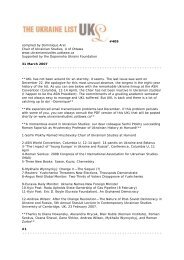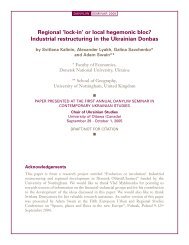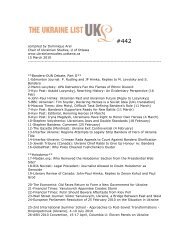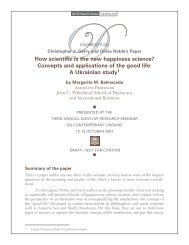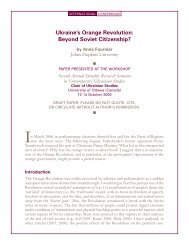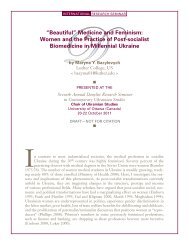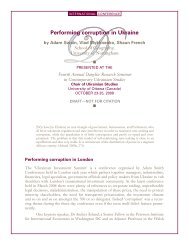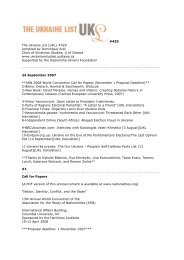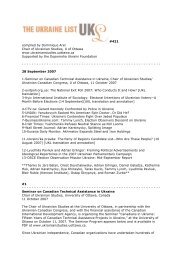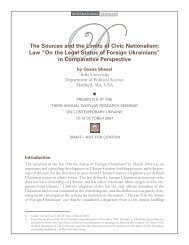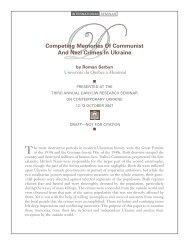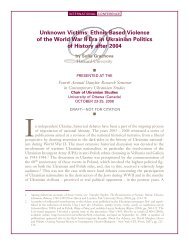Citizenship and nation-building in Ukraine - Chair of Ukrainian Studies
Citizenship and nation-building in Ukraine - Chair of Ukrainian Studies
Citizenship and nation-building in Ukraine - Chair of Ukrainian Studies
Create successful ePaper yourself
Turn your PDF publications into a flip-book with our unique Google optimized e-Paper software.
INTERNATIONAL CONFERENCE<br />
The 1991 citizenship law, adopted when the Soviet Union was still legally <strong>in</strong> existence, 2<br />
def<strong>in</strong>ed the “<strong>of</strong>ficial” <strong>nation</strong> as those who, at the time <strong>of</strong> the law’s entry <strong>in</strong>to force, were<br />
permanently resid<strong>in</strong>g <strong>in</strong> Ukra<strong>in</strong>e, who were not citizens <strong>of</strong> other states, <strong>and</strong> who did not<br />
object to becom<strong>in</strong>g citizens <strong>of</strong> Ukra<strong>in</strong>e, plus those who have previously permanently<br />
resided <strong>in</strong> Ukra<strong>in</strong>e but at the time <strong>of</strong> the law’s entry <strong>in</strong>to force were abroad study<strong>in</strong>g,<br />
work<strong>in</strong>g on state bus<strong>in</strong>ess, or serv<strong>in</strong>g <strong>in</strong> the armed forces. 3<br />
This group – those who were born, or had at least one parent or gr<strong>and</strong>parent born<br />
on the territory <strong>of</strong> Ukra<strong>in</strong>e – has become the “<strong>of</strong>ficial” Ukra<strong>in</strong>ian <strong>nation</strong>, eligible to<br />
acquire citizenship under a simplified procedure. New edition <strong>of</strong> the citizenship law<br />
approved <strong>in</strong> April 1997 extended the “<strong>of</strong>ficial” <strong>nation</strong> to <strong>in</strong>clude those who permanently<br />
resided (<strong>in</strong> addition to those born) on the territory <strong>of</strong> Ukra<strong>in</strong>e, plus their children <strong>and</strong><br />
gr<strong>and</strong>children. 4 The latest edition <strong>of</strong> the citizenship law approved <strong>in</strong> January 2001 added<br />
brothers <strong>and</strong> sisters <strong>of</strong> those who were born or permanently resided on the territory <strong>of</strong><br />
Ukra<strong>in</strong>e to the “<strong>of</strong>ficial” <strong>nation</strong>. The simplified procedure under which those def<strong>in</strong>ed as<br />
belong<strong>in</strong>g to the <strong>nation</strong> were eligible to acquire citizenship was been made simpler with<br />
each edition <strong>of</strong> the law. Thus, the 1991 law exempted those who were born, or had at<br />
least one <strong>of</strong> the parents or gr<strong>and</strong>parents born on the territory <strong>of</strong> Ukra<strong>in</strong>e, from 5 year<br />
residency requirement, 5 the 1997 law exempted them from residency <strong>and</strong> language<br />
requirement, 6 while the 2001 law additionally exempted this group from requirements to<br />
present documentary evidence <strong>of</strong> the legal source <strong>of</strong> <strong>in</strong>come <strong>and</strong> a pro<strong>of</strong> <strong>of</strong> release from<br />
prior citizenship at the time <strong>of</strong> application. 7<br />
Theories <strong>of</strong> citizenship policy <strong>and</strong> the Ukra<strong>in</strong>ian case.<br />
Ukra<strong>in</strong>e’s citizenship law thus def<strong>in</strong>ed the <strong>of</strong>ficial <strong>nation</strong> territorially. The question to ask<br />
is why the <strong>of</strong>ficial <strong>nation</strong> was def<strong>in</strong>ed this particular way. More generally, how does the<br />
political elites arrive at a particular def<strong>in</strong>ition <strong>of</strong> the “<strong>of</strong>ficial” <strong>nation</strong>? Scholars <strong>of</strong> citi-<br />
2. Draft 1991 citizenship law was first debated <strong>in</strong> the Rada <strong>in</strong> July 1991; repeated first read<strong>in</strong>g took place on<br />
12 September 1991; the law was approved on 8 October 1991 <strong>and</strong> entered <strong>in</strong>to force on 13 November 1991.<br />
3. Article 2 paragraphs 1 <strong>and</strong> 2 <strong>of</strong> the 1991 citizenship law, text <strong>of</strong> the law <strong>in</strong> Pravda Ukra<strong>in</strong>y, 14 November 1991.<br />
Under the 1991 law, the latter group (those study<strong>in</strong>g, work<strong>in</strong>g on state bus<strong>in</strong>ess, or serv<strong>in</strong>g <strong>in</strong> the armed forces)<br />
could become citizens <strong>of</strong> Ukra<strong>in</strong>e if they were not citizens <strong>of</strong> other states <strong>and</strong> declared their desire to become citizens<br />
<strong>of</strong> Ukra<strong>in</strong>e with<strong>in</strong> one year after the law’s entry <strong>in</strong>to force. This deadl<strong>in</strong>e was extended to two years <strong>in</strong> January<br />
1993 <strong>and</strong> to five years <strong>in</strong> October 1994. See Verkhovna Rada Ukra<strong>in</strong>y 1993; Verkhovna Rada Ukra<strong>in</strong>y 1994.<br />
4. Article 2 paragraph 3 <strong>of</strong> the 1997 law, for text <strong>of</strong> the law see Verkhovna Rada Ukra<strong>in</strong>y 1997a.<br />
5. Article 17 paragraph 2 <strong>of</strong> the 1991 law.<br />
6. Article 16 <strong>of</strong> the 1997 law.<br />
7. Article 8 <strong>of</strong> the 2001 law. The 2001law still required these persons to present a pro<strong>of</strong> <strong>of</strong> release from prior citizenship<br />
with<strong>in</strong> a year after submitt<strong>in</strong>g citizenship application. For text <strong>of</strong> the law see Verkhovna Rada Ukra<strong>in</strong>y<br />
2001a.<br />
3



